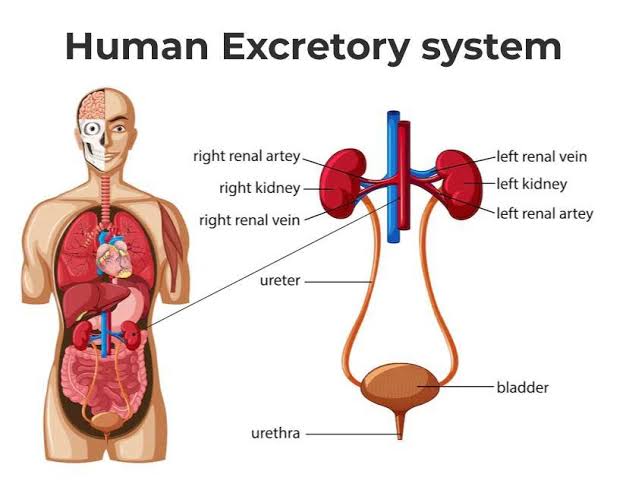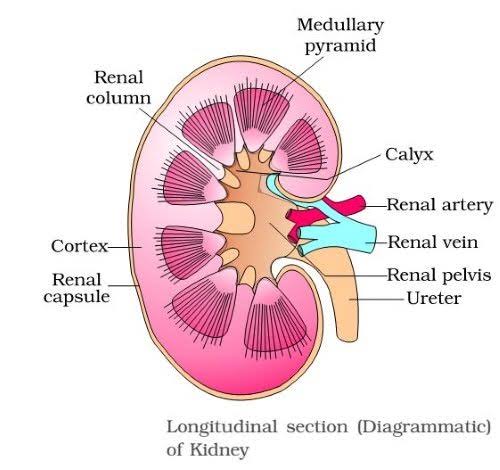
Further Insights into the Excretory System
The excretory system plays a crucial role in maintaining the body’s internal environment by removing metabolic waste products and balancing essential substances like water, salts, and pH. This process is critical for homeostasis, which is the body’s ability to maintain a stable internal environment despite changes in external conditions.
Let’s explore more about its components, processes, regulation, and clinical aspects.
Detailed Breakdown of the Excretory System Components

- Kidneys
The kidneys are the primary organs of the excretory system. Each kidney is made up of about a million nephrons, the functional units of the kidney responsible for filtration, reabsorption, and secretion. - Ureters
The ureters are muscular tubes (one from each kidney) that transport urine from the kidneys to the bladder. They use peristalsis (involuntary contractions of smooth muscle) to propel urine downward. - Bladder
The bladder is a hollow, elastic organ that stores urine until it is excreted. It is located in the pelvic region. It has a muscular wall (the detrusor muscle) that contracts during urination to expel urine through the urethra. The bladder has an internal sphincter muscle, which controls the release of urine. - Urethra
The urethra is the final passage for urine to exit the body. It is longer in males (approximately 20 cm) and shorter in females (about 4 cm). In males, the urethra also serves as the pathway for semen during ejaculation. The opening of the urethra is called the external urethral orifice.
Processes of Excretion in Detail
The excretion of waste occurs through a series of steps that ensure only necessary substances remain in the body, and waste is efficiently removed.
- Glomerular Filtration
- This is the first step of urine formation. Blood enters the kidney through the renal artery, which branches into smaller arteries leading to the glomerulus. The glomerulus is a network of capillaries, and under pressure, fluid (plasma) from the blood is filtered into the Bowman’s capsule.
- The substances that pass into the Bowman’s capsule are water, urea, glucose, amino acids, ions (such as sodium, potassium, and chloride), and other small molecules. Large proteins and blood cells are too big to pass through the filtration barrier and remain in the blood.
- Tubular Reabsorption
- After filtration, the filtrate moves through the proximal convoluted tubule, where most of the valuable substances, including glucose, amino acids, and a significant amount of water and salts, are reabsorbed back into the blood.
- As the filtrate moves through the loop of Henle, water is reabsorbed, and sodium, chloride, and potassium ions are exchanged to create a concentration gradient, which helps in water reabsorption.
- In the distal convoluted tubule, further fine-tuning occurs, including the regulation of sodium, potassium, and pH by the action of aldosterone and antidiuretic hormone (ADH).
- Tubular Secretion
- This is the process by which additional waste products, ions, and drugs (e.g., excess potassium and hydrogen ions) are secreted into the filtrate from the blood. This helps regulate the body’s balance of electrolytes and pH. The secretion of hydrogen ions helps to maintain the pH of the blood within a narrow, optimal range.
- Excretion (Urine Formation)
- The final urine, which consists of water, urea, creatinine, uric acid, ammonia, and excess salts, is collected in the renal pelvis. From there, it flows through the ureters to the bladder, where it is stored.
- When the bladder reaches a certain volume, stretch receptors signal the brain, triggering the urge to urinate. The detrusor muscle contracts, and the urine is expelled through the urethra.
Regulation of the Excretory System
The kidneys regulate various aspects of the body’s internal environment:
- Water Balance:
The kidneys adjust the volume of water reabsorbed depending on the body’s hydration levels. Antidiuretic hormone (ADH) is released by the pituitary gland when the body needs to conserve water. ADH increases the permeability of the collecting ducts, allowing more water to be reabsorbed into the bloodstream. - Electrolyte Balance:
The kidneys regulate the balance of important ions (like sodium, potassium, calcium, phosphate, and chloride) in the blood. The secretion or reabsorption of these ions is controlled by hormones such as aldosterone (for sodium and potassium balance) and parathyroid hormone (for calcium and phosphate regulation). - Acid-Base Balance:
The kidneys help regulate the pH of the blood by excreting hydrogen ions (acid) and reabsorbing bicarbonate ions (base) when needed. This function is crucial for maintaining the body’s pH within the normal range of 7.35–7.45. - Blood Pressure Regulation:
The kidneys play a role in regulating blood pressure through the renin-angiotensin-aldosterone system (RAAS). When blood pressure drops, the kidneys release renin, which activates the RAAS pathway, leading to the release of aldosterone and ADH. These hormones increase sodium and water reabsorption, raising blood volume and pressure.
Disorders of the Excretory System
- Chronic Kidney Disease (CKD):
A progressive loss of kidney function over time, often due to high blood pressure, diabetes, or glomerulonephritis. CKD can lead to kidney failure, requiring dialysis or a kidney transplant. - Kidney Stones:
Hard deposits of minerals and salts that form inside the kidneys. They can block urine flow and cause intense pain. Stones can vary in size and may require medical intervention to remove. - Urinary Tract Infections (UTIs):
Bacterial infections that can affect any part of the urinary system, causing pain, frequent urination, and discomfort. Untreated UTIs can lead to kidney infections. - Bladder Cancer:
Cancer that originates in the cells of the bladder. It often causes symptoms such as blood in the urine and pain during urination. - Acute Kidney Injury (AKI):
A sudden, temporary loss of kidney function often caused by dehydration, infection, or toxins. It can lead to fluid retention, imbalanced electrolytes, and waste buildup in the blood.
Conclusion
The excretory system is essential for maintaining internal stability in the body. It not only eliminates waste products but also regulates fluid balance, electrolyte levels, and pH. This process is highly coordinated and influenced by a variety of hormones and feedback mechanisms. Proper functioning of the excretory system is critical for overall health, and disruptions can lead to serious medical conditions that require timely intervention.

Leave a Reply